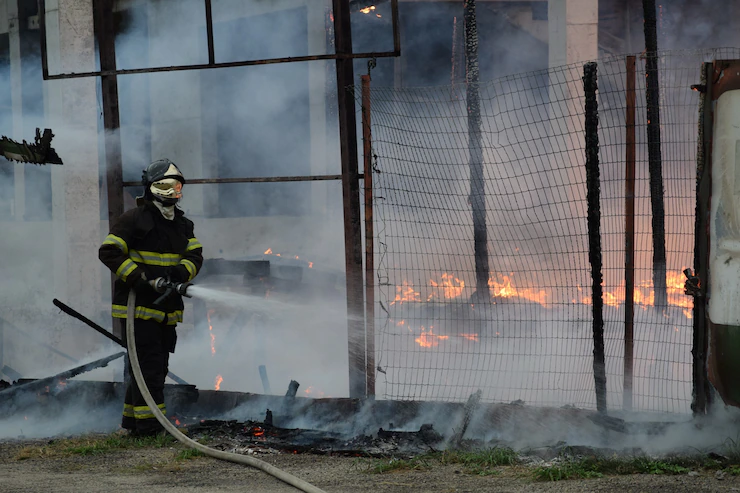What to Know About Fire Insurance:- Fire insurance is a form of financial protection against losses resulting from fire damage, making it one of the most widely available types of coverage and available for both residential, commercial, and industrial properties. It serves to safeguard homes or other properties against financial loss caused by fires. It provides necessary financial coverage against financial liabilities.
Fire insurance policies typically cover the costs associated with rebuilding or repairing damaged properties and any losses sustained from fire, including personal items, furniture, or any other losses caused by it. Fire insurance also helps cover expenses related to evacuation, temporary housing and related costs; however it doesn’t cover liabilities or medical costs so additional forms of coverage should be utilized to ensure protection from such losses.
What Is Fire Insurance?
Fire insurance provides financial protection against losses caused by fire. This form of property insurance helps cover damage sustained from fire and losses as a result of it, such as rebuilding costs or replacing lost possessions, as well as additional living expenses in case your home must be evacuated as a result of one.
Fire insurance covers not only a building but also any personal belongings stored within it, such as furniture, electronics equipment and clothing. Furthermore, it covers any injuries or deaths caused by fire; you can purchase such coverage both as part of homeowner’s policies as well as as standalone policies.
Before purchasing fire insurance for your home, it is essential that you consider what coverage options would best meet the needs of your residence. This will determine both the type and amount of coverage necessary, as well as any extra living expenses if a fire forces you out of your residence. It is also wise to review your policy regularly in case it needs updating in case a catastrophic event takes place that requires evacuation.
Know About Fire Insurance:-
1. What It Does & Does Not Cover

ire insurance is a form of property coverage designed to safeguard both residential and commercial properties against damage from fire, including financial losses associated with it. Furthermore, this form of property insurance also covers smoke damage, explosions and any additional losses related to other forms of fire damage events that may happen – however it also has restrictions regarding what exactly it covers and does not. So what exactly does fire insurance cover and does not?
Fire insurance typically covers both the physical structure of a property as well as any damaged personal belongings such as furniture, electronics and appliances that have been damaged in an incident. Furthermore, this coverage will cover living expenses should a damage repair process take longer than anticipated.
Note, however, that fire insurance doesn’t cover everything – theft, vandalism, flooding, earthquakes and other natural disasters don’t fall under its coverage either. Furthermore, policies may not extend coverage to vehicles or any other property outside the structure itself.
When considering fire insurance, it’s essential that you read your policy thoroughly to make sure it addresses what you require it for. Fire insurance can protect against financial losses related to fire, but it’s vital that you understand its specifics if they apply to you.
2. Fire Insurance Policy

Fire insurance coverage should be one of the primary considerations if you own a home or business, to protect from financial losses associated with property damaged in a fire. Fire coverage includes repair or replacement expenses as well as any expenses resulting from fire-related incidents; as well as personal belongings damaged in a fire.
Before purchasing fire insurance, it is essential to consider both your coverage needs and any additional policies which may be necessary. These could include additional living expenses like temporary housing or meals should an incident cause irreparable damage in your home; as well as additional protection for items like antiques or art.
Before purchasing a fire insurance policy, it’s essential that you understand exactly what’s covered under it and read carefully to understand all its terms and conditions. Furthermore, review your policy periodically to make sure it remains up-to-date and that you are adequately covered – fire policies can be expensive; make sure you shop around to find one with competitive rates and coverage that best meets your needs!
3. Consider Fire Insurance As A Safety Net Against Home Fires
Fire insurance is an essential asset for homeowners looking to safeguard their properties from fire-related financial losses. Fire coverage will cover repairs, personal item replacement and any related expenses in case of a home fire – providing much-needed financial protection in an otherwise devastating event.
Fire insurance policies also cover smoke and water damage losses, helping reduce the financial strain caused by home fires by covering cleaning costs associated with cleaning up after them and repairs afterward. Furthermore, some policies include liability protection that could help shield homeowners in case any lawsuits related to them arise.
When purchasing fire insurance, it is crucial that you carefully read through and assess each policy’s details in order to make sure it addresses all potential risks associated with a home fire. Comparing policies and prices will enable you to find one with adequate protection at the most reasonable cost. Consider fire insurance as a safety net against home fires; make sure your policy includes adequate coverage to guard your property against financial losses caused by such events.
Benefit Of Fire Insurance
Fire Insurance Is Essential Property owners understand the value and necessity of fire insurance coverage as it offers protection from fire-related damage, smoke damage and liability issues to both their buildings and contents. Taking out fire insurance protects both residential and commercial properties in case a fire breaks out – helping ensure their financial wellbeing in case something arises unexpectedly.
One of the major advantages of fire insurance is providing protection should a fire-related loss occur. Damage caused by fire and smoke may be extensive and costly to repair; Fire Insurance offers financial relief so you won’t need to bear this responsibility alone.
Fire insurance covers the damages associated with fires in addition to smoke and water damage, loss of business income and extra expenses incurred due to them. Furthermore, it can help recover property and belongings as well as legal assistance if needed in taking legal action to pursue compensation claims for your losses.
Fire insurance can be an invaluable way to financially safeguard yourself against the devastating aftermath of a fire, so it is wise to shop around and compare various policies so as to get the optimal one for your individual needs.
Conclusion
Fire insurance is an integral component of property ownership. It offers protection from physical damages caused by fire or smoke as well as losses such as property damages and income lost as a result. Fire policies also can cover additional living expenses should they have to evacuate after experiencing a fire emergency.
Fire insurance policies can be tailored to fit an individual’s individual needs, such as providing coverage for specific types of property or liability coverage if someone is injured in a fire on their own property. Therefore, fire insurance should be strongly considered by anyone owning property to mitigate against losses that might occur from potential fires on their premises.
Also read:- Everything You Need To Know About Disability Insurance

